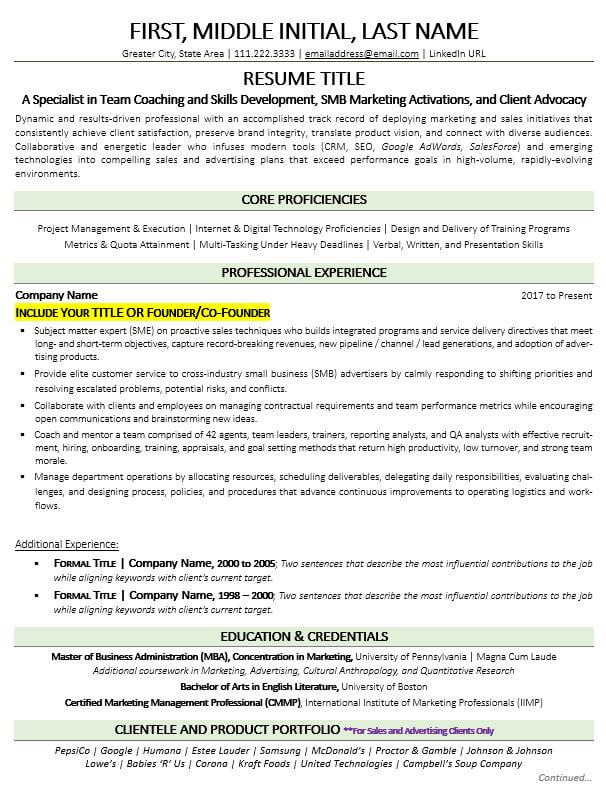
If you’ve owned your own business and now find yourself returning to the workforce, there are certain things you need to do to maximize your odds of landing a great job. Of course, creating a great resume is at or near the top of that list.
Most entrepreneurs are uncertain about how to include their entrepreneurial skills within their resume. Sure, you’ve undoubtedly developed and used skills as a business owner that would provide great benefits in any company setting. But how do you convey those skills to an employer without scaring them away?
Luckily, you’ve come to the right place. In the following guide, we have the 10 steps you need to write a good resume after being a business owner or entrepreneur. As if that wasn’t enough, we’ve also got a stellar example of an ATS-compliant resume.
10 tips on writing a resume after being an entrepreneur
If you’ve had a business before now, you may be concerned that it will hold you back in the working world. However, you needn’t worry. Starting a business requires a diverse skill set and an enormous amount of drive. Hiring managers are well aware of that fact. So long as you position your entrepreneur resume correctly, you will be certain to win them over.
Chances are, it’s been a while since you last wrote a resume. You may not have a clue where to start when it comes to putting pen to paper. Here at ZipJob, we have the advice that you need to create an interview-winning application. Follow our expert tips below.
1. Familiarize yourself with the resume layout
First, you need to make sure that you’re clued up when it comes to the layout of an entrepreneur's resume. There’s a standard format that hiring managers expect to see when they are reviewing applications. Nail that, and you’ve done half of the job already.
You need to include the following sections (typically in this exact order): resume header, professional summary, core competencies (e.g., skills), work experience, and education.
These elements make up the basic structure of a resume, but it doesn’t have to end there. You can include additional sections – such as volunteer experience, freelance work, and activities – to bolster your application. Whenever you are considering including a specific section, ask yourself whether it adds real value to your entrepreneur resume first.
2. Select the right format for the job
Did you know that there is more than one resume format you can use? You are likely familiar with the standard approach. That is the reverse chronological format. For this structure, you start with your most recent job positions and qualifications and work your way back in time. In most cases, this format works well and efficiently highlights a candidate’s expertise.
However, it is by no means the only option. As an entrepreneur, your professional life will have been anything but linear. For example, you may have hopped from startup to startup, supplementing your income with freelance work or other gigs along the way.
If that’s the case, you might find that using a functional resume format is the best way to accurately showcase the lessons you’ve learned. This approach puts the spotlight on your talents and expertise while your work experience takes something of a back seat.
Of course, there may be times when you want to fuse both a reverse chronological format and a functional format, using elements of both. This approach is known as a hybrid resume format and can work well if you have had a nontraditional career before now.
Expert Tip
Take the time to decide which resume format works for you. Every entrepreneur has a unique journey, and so there’s no cookie-cutter solution. Figure out which of the available formats best conveys your value to the hiring manager. You might want to try out a couple of the approaches and see which one is right for your job search.
Looking for some more inspiration? View 200+ more professional resume samples for all industries, along with a free template and expert-backed writing guides.
3. Focus on your (selective) achievements
We won’t beat around the bush. Writing a compelling business owner’s resume can be challenging, but you can create a truly stellar document by focusing on the things that matter, namely, filing your resume with notable experiences and achievements.
Hiring managers are less interested in where you’ve come from than in what you did while you were there. Learn as much as you can about the company you want to work for and identify its most pressing concerns. You can then use your resume to describe achievements that addressed similar problems in the past.
For example,
Is the company having problems with decreased sales?
Is it experiencing an unusually high level of turnover?
Is it perhaps confronted with a company culture that is creating a negative atmosphere for employees?
If you had success growing sales at your own company or proven expertise in team-building, you can highlight examples of those achievements in your business owner resume. The goal is for the employers to recognize that you’re the solution to whatever problems their company is trying to solve.
4. Showcase the valuable lessons learned as a business owner
Starting a business is far from easy – and don’t you know it? If you’ve built something from the ground up, talk about what you learned along the way on your entrepreneur resume.
Demonstrate your ability to learn and adapt to new situations and challenges. Describe specific problems that you encountered, how you resolved them, and how that impacted your future strategies. While companies are focused on ensuring that employees can follow directions, they also want innovators and people with leadership skills. The hiring manager needs to know that you’re a problem-solver and someone who learns from every experience.
When sharing your accolades, make sure that you are clear and concise. The hiring manager only has a matter of seconds to determine whether you may be the right fit for the position. Put simply, they don’t have the time to read long, meandering sentences. When detailing your business experiences, keep them short and to the point. That way, the reader can quickly and easily gain the information that they need from your entrepreneur resume.
Expert Tip
Try using the STAR method on your resume!
Everything you write needs to make a strong point. To help you avoid writing unnecessary sentences, you can use the STAR method. That means that you outline the Situation and Task you needed to complete, followed by the Action you took and the Result.
5. Describe your achievements using quantifiable numbers
When you’re describing accomplishments, use hard numbers to demonstrate real value. You want to paint a picture in the reader’s mind, so the hiring managers can easily imagine you adding that sort of value to their company if they hire you. For example:
Designed and executed customer acquisition strategy that increased daily customers by 20%
Implemented sales strategy that increased monthly sales by $100,000
Launched customer appreciation bonus plan that increased client retention by 80% in six months
Quantifying your experiences gives them color. Since the hiring manager won’t be able to speak to a former boss (as that’s you!), they need evidence of your work. The more facts you include when making bold claims, the stronger your application will be. It’s all about giving the reader verifiable evidence of your experiences up until this point.
6. Emphasize your teamwork skills
Your ability to work as part of a team is critical in pretty much any role. If you want to be taken seriously, your business owner resume must emphasize your teamwork skills. Should the hiring manager have any concern that you won’t gel with the wider company, now is the time to dispel that.
You can do so by discussing projects and strategies in your own company that saw you work with others to achieve common goals. Those efforts may have been in collaboration with clients or your own employees. The important thing is that you convey to the hiring manager that you are a real team player.
7. Highlight how you progressed over time
Your company didn’t just magically achieve success overnight – if at all. It’s most likely that you started with limited success and small sales or projects and progressed to larger deals as time went on. As your business grew and developed, your own responsibilities and role almost certainly grew as well.
Your entrepreneur resume should include challenges that you encountered at different stages of your growth. Describe the actions that you took to address those challenges and the results that those actions achieved. This will showcase your ability to take on more responsibility and greater challenges in any job role.
8. Make a statement in your summary
You need a powerful summary statement at the beginning of your resume. This short blurb about you tends to be one of the first things that people read. You only have around three to five sentences to play with, so you need to make them count. Lead with your biggest achievement to date and, if possible, quantify it. This approach means that the hiring manager will instantly understand what value you could bring to this new position.
The wording that you choose here matters greatly. You need to make a real statement and stand out from the crowd. As you craft this short, yet compelling, paragraph about your professional life, make sure that you are using powerful action verbs and interesting language.
9. Include the right keywords
Before the hiring manager reads your entrepreneur resume, it needs to get past the Applicant Tracking System, or ATS. The software scans incoming applications to see how well they each meet the criteria of the vacancy. You can increase your chances of beating the bots by including the right keywords and phrases in your document. To do so, go back to the original job advert and take a look for any industry-specific words. Using these in your resume could make all the difference when it comes to whether you land that interview.
10. Proofread, proofread, proofread
By this point, you may feel prepared to write and submit a stellar entrepreneur resume. However, there is one last thing that you need to consider. That is, proofreading. Spelling mistakes or grammatical errors will be looked upon poorly by the hiring manager. You don’t want to destroy your chances by failing to do this final thing. With that in mind, make sure that you reread your resume before you send it off to a prospective employer. You can also use a program, such as Grammarly, to double-check your resume content too.
Bonus: don’t forget to cover the basics
Our 10 tips can help you focus on the right elements while you create your entrepreneur resume. However, it’s important that you cover all the basic elements as well. That means reading your entrepreneur resume and making sure that everything is on point. Check the dates, the names of companies, and ensure that everything is correct.
ATS-compliant entrepreneur resume example
Ready to get started on your next application? You’ve come to the right place. Take a look at our ATS-compliant entrepreneur resume example below:

Tricky but doable
Creating an entrepreneur resume can be tricky. However, as a former business owner, you most certainly have the expertise that will blow the hiring manager away. By focusing on your skills and achievements, de-emphasizing your role as a company owner, and talking about your desire to work with a team once again, you can land more interviews and make the right impression on hiring managers.
Make sure that your application is hitting the mark by using our free resume review tool. Find out what changes you could make to supercharge your next application.
Recommended reading:

Written by
Charlotte Grainger, Editor & Content Writer, Charlotte Grainger, Editor & Content Writer
Charlotte Grainger is a freelance writer living and working in Sheffield, UK. She has a passion for career development and loves sharing tips and advice. Follow her on Twitter
